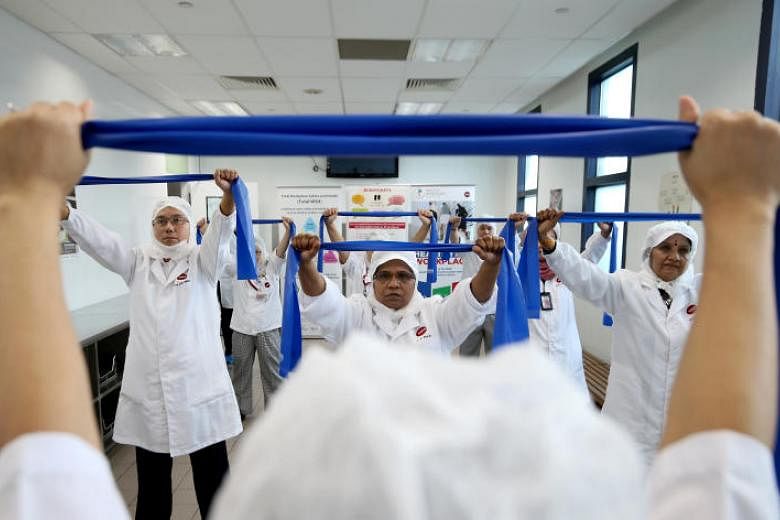SINGAPORE - Companies seeking to improve safety and health in the workplace can now get assistance to do so, as part of a one-year assistance programme under the Tripartite Oversight Committee on Workplace Safety and Health (2017-2020).
The committee announced the launch of the programme on Friday (July 19) - the first time the programme has been opened to the public - during a tour of Sats Inflight Catering Centre 1 (SICC 1).
The catering service provider is one of 20 companies that were previously invited by the WSH Council to join the pilot programme.
Under the assistance programme, companies will receive guidance as they undergo a three-phase approach to implementing workplace safety and health.
The three phases are assessment, intervention, and monitoring and evaluation.
During the assessment phase, companies identify significant risks and gaps in the management of workplace safety and health and also profile the status of their workers' health.
Next, during intervention, companies address significant risks and health issues that impact work and safety.
They do so by improving their safety and health management system and designing intervention programmes. These may take the form of healthy lifestyle programmes, ergonomics training, or a redesign of work.
Finally, companies will monitor and evaluate the outcomes and effectiveness of the intervention programmes.
Companies in the construction, manufacturing, transport and storage, food and beverage and cleaning sectors can receive complimentary consultancy services while going through these phases.
Senior Minister of State for Health Amy Khor, who is a co-chair of the Tripartite Oversight Committee, highlighted the link between health and safety in the workplace during Friday's tour.
She said: "We know that a healthy worker is a fitter and more alert worker, and that will help reduce the risk of workplace injuries, as well as (create) a more productive and effective workforce."
Healthy workers also result in a lower absenteeism rate in the workplace, she said.
Minister of State for Manpower Zaqy Mohamad, who also co-chairs the committee, noted that workers today are expected and wish to work for more years, and that health would be a "major concern" for them.
"Health of our workers is just as important as safety," he said during the tour.
In March, Sats shared its safety and health practices with the WSH Council and the Health Promotion Board (HPB ) through a questionnaire.
An on-site visit was also conducted by the council and HPB to understand how workers carried out their jobs at their respective workplaces, and a survey was done to gain a better understanding of the health profile of Sats' workers.
The assessment report revealed that a significant number of employees from the Inflight Catering Centre 1 Business Unit experienced pain in their lower back, shoulders, knees and neck.
In response, Sats reviewed its infrastructure and processes to reduce the risk of such pain for its employees. Some issues that were found included standing for a prolonged duration, stooped working postures and engaging in repeated manual lifting.
With the support of the WSH Council and HPB, Sats conducted a series of ergonomics training sessions to teach its employees the correct posture and techniques to lift heavy goods.
Employees also learnt customised stretches and exercises to increase their flexibility and strengthen their muscles, and pain-relief techniques such as hot and cold treatments and pressure point massages.
Preliminary results found that 27 per cent of participants experienced a reduction in pain after three months, while 16 per cent reported improvements in flexibility.
Sats also realised the need to do more in the area of preventive health management for its employees, encouraging them to exercise and eat healthily.
It intends to conduct coaching sessions to teach its staff how to manage chronic conditions and to keep to their goals in healthy living. It has also worked with HPB to provide lower-calorie options at all the stalls in its SICC 1 cafeteria.
Mr Alex Hungate, chief executive officer of Sats, acknowledged that it had cost the company "millions" to invest in workplace safety and health, but said it was an investment Sats was "happy to pay".
"It pays back so many times, with more engaged people (and) less workdays lost," he said.
He added that having a guided process, such as the three-phase one implemented by the WSH Council and HPB, was useful as it allowed the company to learn quickly and benefit from other companies' best practices.
Sats operations assistant Savithri Pillay, 62, whose job involves her standing for most of her eight-hour shift, felt she had benefited greatly from the WSH programme.
"Previously I'd get tired very fast and had to find a seat to sit down. Now I can walk around more freely," she said.
Companies that wish to sign up for the Total WSH assistance programme can do so at www.wshc.sg/totalwsh
Those with queries may write to totalwsh@wshc.sg


